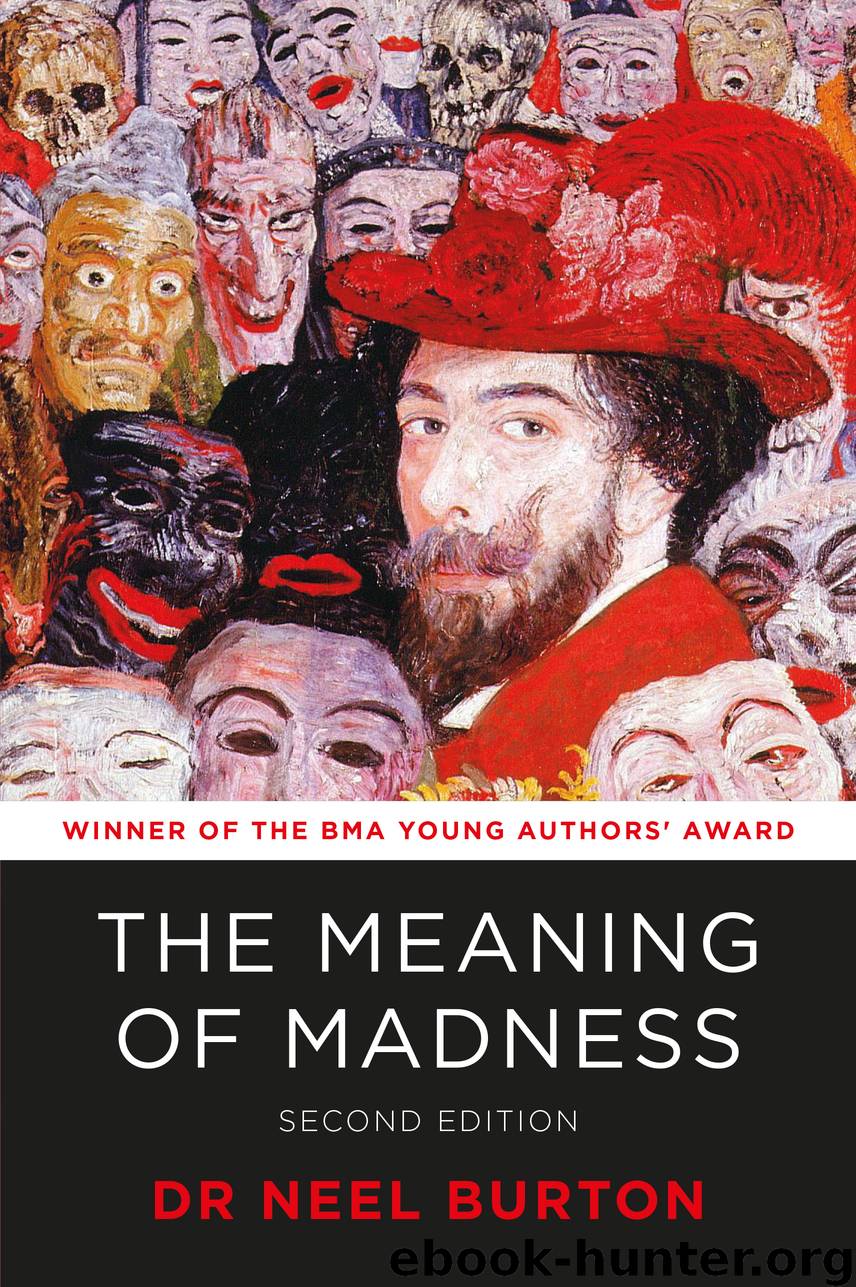The Meaning Of Madness 2nd Edition by Neel Burton

Author:Neel Burton
Language: eng
Format: epub
Publisher: Acheron Press
Frankl is credited with coining the term 'Sunday neurosis' to refer to the dejection that many people feel at the end of the working week when at last they have the time to realize just how empty and meaningless their life has become. This existential vacuum may open the door on all sorts of excesses and compensations such as neurotic anxiety, avoidance, binge eating, drinking, overworking, and overspending. In the short-term, these excesses and compensations carpet over the existential vacuum, but in the longer term they prevent action from being taken and meaning from being found.
For Frankl, depression results when the gap between what a person is and what he ought to be, or once wished to be, becomes so large that it can no longer be carpeted over. The person's goals seem far out of reach and he can no longer envisage a future. As in Psalm 41, abyssus abyssum invocat —'hell brings forth hell', or, in an alternative translation, 'the deep calls unto the deep.'
In recent decades, depression has become increasingly common in industrialized countries, and is often referred to by doctors as 'the common cold of psychiatry'. Figures for the lifetime risk of developing depression vary according to the criteria used to define the condition. Using DSM-5's criteria for 'Major Depressive Disorder', which are similar to ICD-10's criteria for moderate depression, the lifetime prevalence of depression is about 15 per cent, and the point prevalence about 5 per cent. This means that the average person has a 15 per cent chance of having suffered from depression at some time, and a 5 per chance of suffering from it at this point in time.
These figures mask an uneven gender distribution, with women twice more likely to be diagnosed with depression than men. The reasons for this asymmetry are unclear, and thought to be in parts biological, psychological, and sociocultural.
Possible biological explanations: compared to men, women are subjected to fluctuating hormone levels, particularly around the times of childbirth and the menopause. Beyond this, they might also have a stronger genetic predisposition to developing depression.
Possible psychological explanations: women are more ruminative than men, that is, they tend to think through things more. Men, in contrast, are likelier to respond to life problems with stoicism, anger, or substance misuse. Women also tend to be more invested in relationships, and so more affected and afflicted by relationship issues.
Possible sociocultural explanations: women come under greater stress than men. In addition to going to work just like men, they are often expected to bear most of the burden of maintaining the family home, bringing up the children, and caring for older relatives—and, after all that, they still have to put up with the sexism! Women live longer than men, and extreme old age is often associated with bereavement, loneliness, poor health, and precarity. Finally, women are more likely to seek out a diagnosis of depression than men. They are more likely to consult a doctor and more likely to discuss their feelings with the doctor.
Download
This site does not store any files on its server. We only index and link to content provided by other sites. Please contact the content providers to delete copyright contents if any and email us, we'll remove relevant links or contents immediately.
When Breath Becomes Air by Paul Kalanithi(7264)
Why We Sleep: Unlocking the Power of Sleep and Dreams by Matthew Walker(5642)
Paper Towns by Green John(4169)
The Immortal Life of Henrietta Lacks by Rebecca Skloot(3826)
The Sports Rules Book by Human Kinetics(3588)
Dynamic Alignment Through Imagery by Eric Franklin(3489)
ACSM's Complete Guide to Fitness & Health by ACSM(3469)
Kaplan MCAT Organic Chemistry Review: Created for MCAT 2015 (Kaplan Test Prep) by Kaplan(3423)
Introduction to Kinesiology by Shirl J. Hoffman(3301)
Livewired by David Eagleman(3122)
The River of Consciousness by Oliver Sacks(2992)
Alchemy and Alchemists by C. J. S. Thompson(2911)
The Death of the Heart by Elizabeth Bowen(2901)
Descartes' Error by Antonio Damasio(2731)
Bad Pharma by Ben Goldacre(2730)
Kaplan MCAT Behavioral Sciences Review: Created for MCAT 2015 (Kaplan Test Prep) by Kaplan(2492)
The Gene: An Intimate History by Siddhartha Mukherjee(2491)
The Fate of Rome: Climate, Disease, and the End of an Empire (The Princeton History of the Ancient World) by Kyle Harper(2436)
The Emperor of All Maladies: A Biography of Cancer by Siddhartha Mukherjee(2431)
